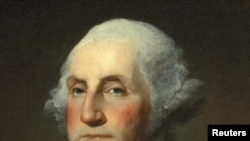Today, February 20th, is Presidents Day in the United States, when Americans pause to honor their national leaders, beginning with the first president, George Washington.
From the time of his death in 1799, his birthday, February 22, was marked unofficially. It formally became a national holiday in 1885. Over time, Americans also began honoring another great leader, Abraham Lincoln, whose February 12 birthday falls near Washington's. Official recognition of the two began in 1971, with a day honoring all presidents every year on the third Monday of the month.
Washington won lasting fame for leading Americans to victory in the war for independence from Britain. His popularity was such that he could have made himself a king if he'd so chosen. Some of the officers in his army, impatient with the democratic process, urged him to do just that.
"Banish these thoughts from your mind," Washington said, and issued a stern reprimand to those who made the suggestion. He ordered the army disbanded, resigned his commission as commander-in-chief and retired to private life.
At the time, America was a loose confederation of thirteen states. Over the next six years, Americans struggled to devise an effective federal government, but one that left important powers to the states. Many Americans distrusted the idea of a central government and feared abuses of power by federal officials, especially the president.
At this critical time, Washington was the one person who most Americans were willing to trust. He was the unopposed choice to be the nation’s first president.
When he took office, the United States had a constitution, but its government was not yet organized. When he stepped down, the U.S. was recognized by the world's major powers. Washington put the nation on a sound financial footing and created an effective military to protect America's expanding frontiers.
In revolutionary France, democratic ideals gave way to turmoil, terror and repression. But in the United States, under Washington's leadership, revolution produced stable, democratic, and lawful government. By leaving office voluntarily after two four-year terms, he set an important precedent for all future presidents. He also oversaw a peaceful transfer of power from one elected leader to another, a principle vital to democracy and an example for peoples around the world.
President's Day

Americans pause to honor their national leaders, beginning with the first president, George Washington.



